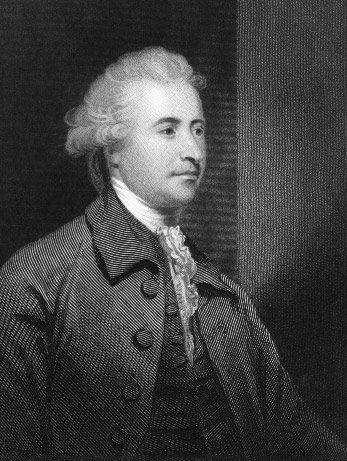Edmund Burke Was Not the Georgian Era’s David Brooks
I’m working on a review of Jonah Goldberg’s The Tyranny of Cliches: How Liberals Cheat in the War of Ideas for a forthcoming issue of the print magazine. There’s a point that Jonah makes that I don’t have room to address in the review, but it’s a good one. So I thought I’d discuss it here.
Jonah writes:
Given that modern conservatism was born as a reaction to various utopian ideologies, starting with the French revolution, it’s not surprising that the first opponents of ideology were on the political right. Edmund Burke, the founding father of modern conservatism, was a famous anti-ideologue who derided the Jacobin madness that was sweeping the continent.
But it’s vital to understand that what the original conservatives denounced as ideology was in fact only a certain kind of ideology, one that was both utopian and characterized by what Friedrich Hayek called “intellectual hubris.” What Burke objected to was the effort of radicals to denounce the past, to deride the “wisdom of the ancients,” to believe that a small clique of visionary experts could impose a whole new system of living on society without taking into account the gravity of culture or the immutability of human nature.
One of the central arguments in Jonah’s book is that everyone, not just extremists, has an ideology. For Jonah, “ideology” is more or less synonymous with “principles.” I have a problem with that, which I’ll talk about in the review. For now, I want to talk about Burke.

Lately, it seems that calling oneself a “Burkean conservative” has become shorthand for “I’m not a wingnut.” It’s true that Burke counseled moderation and prudence in his politics; he said that reform was an essential means of preservation. But it does violence to Burke’s legacy to, therefore, think of him as the David Brooks/Gergen of his era.
Burke had first principles, in the defense of which he was often quite passionate.
It seems obvious to say so in this light, but this is why Corey Robin criticizes Burke from the left (unfairly, I think) in his book The Reactionary Mind.
The great Irving Babbitt had the scoop on this back in 1924, in Democracy and Leadership:
I have presented Rousseau in his essential influence as the extremist and foe of compromise. In contrast to Rousseau, Burke is usually and rightly supposed to embody the spirit of moderation. Many of his utterances on the French Revolution, however … are scarcely suggestive of moderation, and toward the end he becomes positively violent. … Burke was no mere partisan of the status quo. He was not opposed on principle to revolutions. He is perhaps open to the charge of pushing too far his admiration for the Revolution of 1688. His attitude toward the American Revolution was consistently one of compromise and in many respects of sympathy. He did stand in any undue awe of those in authority. No one could on occasion call them to a stricter accounting or show himself a more disinterested champion of the victims of unjust power. He recognized specifically the abuses of the Old Regime in France, and was ready to admit the application to these abuses of fairly drastic remedies. If he refused, therefore, to compromise with the French Revolution, the reason is to be sought less in the field of politics than in that of general philosophy, and even of religion. He saw that the Revolution did not, like other revolutions, seek to redress certain specific grievances, but had universal pretensions.
Now, I happen to think there are aspects of mainstream conservatism — the complete detachment from arithmetic reality on the issue of federal revenues, for example — that look more like “universal pretensions” than prudence.
But Jonah is right: It’s misleading to think of Burke as having occupied the “vital center.”
Comments